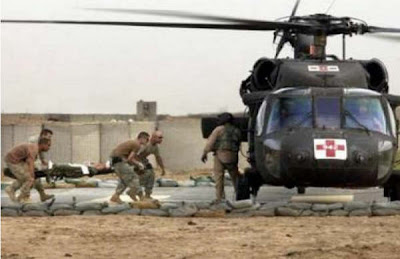 |
| [image source: wikipedia] |
The thought for the day comes from an ancient book, The Art of War, which was written many centuries ago by Sun Tze, a Chinese general, military strategist, philosopher and writer. That particular passage continues: Hence, when we are able to attack, we must seem unable; when using our forces, we must appear inactive; when we are near, we must make the enemy believe we are far away; when far away, we must make him believe we are near.
Deception. It can win wars, and the more clever the deception, the more effectively it works. I reckon everybody's familiar with the classic tale of the Trojan Horse, but have you ever heard of World War II's Ghost Army?
Nope, they weren't literally a group of deceased spirits looking after the soldiers, but their behind-the-scenes top secret missions sure did save a lot of lives. I guess you could say they were... weapons of mass deception. (Sorry.) Their mission: to deceive the enemy, and their work was done in complete anonymity and without acknowledgement. In fact, their fellow soldiers didn't even know their unit existed, let alone what they did... until 1996, when the U.S. government declassified the existence of the 23rd Headquarters Special Troops. AKA the Ghost Army. Some of their missions remain classified today.
 |
| [source: National Archives] |
Looking at this photo, you might think these guys possessed some kind of super strength. But nope, they weren't super-strong. In fact, the 1100 men of this unit were recruited from places like art schools and ad agencies. What the government wanted... what they needed... were artists, illustrators, actors, sound specialists, and radio experts. People with good minds and an active sense of creativity. The ability to create illusions and to think outside the box. Because they used inflatable tanks, sound trucks, fake radio transmissions, and scripts that were worthy of a Cecil B. DeMille production.
 |
| [source: National Archives] |
Staging more than twenty battlefield deceptions... that we know of... including the largest deception in military history, which they carried out on D-day, it's estimated that their ability to fool the Germans saved more than twenty thousand lives. With their hard work and ingenuity, their tactics made their small unit appear to be 30,000 strong.
 |
| [source: National Archives] |
Here's one of their pieces of rubber artillery. Standard procedure was to inflate tanks, cannons, jeeps, trucks and airplanes and then camouflage them in such a way that German reconnaissance planes flying overhead could detect them. They created fake airfields, soldier bivouacs, (right down to laundry hanging on the clotheslines) motor pools, artillery batteries, and tank formations... all with a few hours notice.
On D-Day, their deception convinced the Germans that the attack was coming from Calais, which is about two hundred miles north of the actual attack site at Normandy.
 |
| [source: National Archives] |
One of their fake planes.
 |
| [source: National Archives] |
Even fake landing craft.
 |
| [source: National Archives] |
Five hundred-pound speakers played an important part in their ruses, too. Prior to deploying to Europe, some Bell Labs engineers worked with a team from this unit to create state-of-the-art recordings of armored and infantry units at Fort Knox. Various mixtures of these sound effects would be blasted from these speakers to give the sonic deceptions they needed to create their auditory illusions.
They even transmitted what they called spoof radio. They conducted fake traffic nets, impersonating real operators from other units. Although Morse Code involves sending dots and dashes, each operator has a distinctive way of doing it, called his fist. These guys even knew how to impersonate an individual operators' fist, so the enemy wouldn't know the real operator... and his entire unit... were no longer in the area.
Lest you think I'm trying to romanticize war, I'm not. But what these guys did is remarkable, and now that part of their story has been told, I wanted to share it with you. What can I say? I'm a history nerd, and I thought this was a fascinating story. PBS did a documentary about them a few years, but I missed it. (Doggone it!) But here's a trailer for that show:
Amazing story, isn't it? I wonder what else we don't know about World War II...?
Until next time, take care of yourselves. And each other.
War is wretched beyond description, and only a fool or a fraud could sentimentalize its cruel reality. [John McCain]
Wars are poor chisels for carving out a peaceful tomorrow. [Martin Luther King, Jr.]
If we don't end war, war will end us. [H.G. Wells]
Every gun that is made, every warship launched, every rocket fired, signifies in the final sense a theft from those who hunger and are not fed, those who are cold and are not clothed. [Dwight D. Eisenhower]
Hate war... but love and appreciate those who fight and sacrifice in them for our benefit. [me]



















































